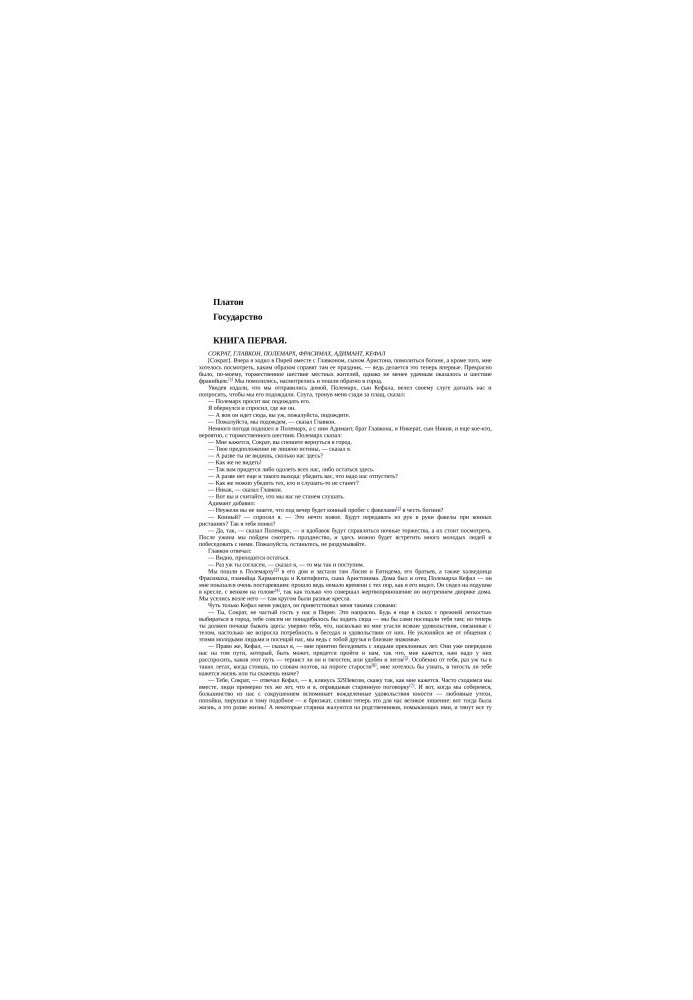State
 Instant download
Instant download
after payment (24/7)
 Wide range of formats
Wide range of formats
(for all gadgets)
 Full book
Full book
(including for Apple and Android)
The dialogue "State" in its size, abundance of used material, depth and diversity of the studied problems occupies a special place among the works of Plato. This is a good thing ,. As a picture of an ideal society , with such inspiration presented by Socrates in conversation with his friends , involuntarily affects all spheres of human life - personal , Family , with all the intellectuals, Ethically , aesthetic aspects and with a constant striving for the real life embodiment of the highest good . "State" is the first part of the triptych, followed by "Timaeus" (the creation of the cosmos by a demiurge on an ideal model) and "Critia" (the principles of an ideal society in their practical implementation) If "Timaeus" and "Critius" refer to the last years of Plato's life, then "The State" is written in the 70s and 60s of the IV century. before n. e. The action of the dialogue itself is thought almost simultaneously with "Timeus" and "Critias" - about 421 or 411-410 BC. in the month of Targelion (May-June). Talk in the house of Kefal about the state Socrates tells the next day to friends, with whom the next day will listen to the reasoning of Timaeus ... Therefore, ,:------------------------------------------------------------------------------------------------------------------------------------------------------------------------------------------------------------------------------------------------------------------------------------------------------------------------------------------------------------------------------------------------------------------------------------------------------------------------------------------------------------------------ "The State" , being a detailed retelling of the real meeting of Socrates and his interlocutors , is devoid of any dramatic action and imperceptibly turns into a leisurely , A careful presentation with examples , Retreats , and reminders. Quotes, myths, Symbols, Computation, political and aesthetic characteristics and formulas. According to Timaeus (see .) Introductory remarks, p. 661), the conversation took place on the day of the celebration of Artemis-Bendida, revered by the Thracians and Athenians . This conversation in Piraeus, near Athens, took several hours between the day's solemn procession in honor of the goddess and the lampadodromia (run with torches) also in her honor. Among the actors, the main place is occupied by Socrates and Plato's siblings, the sons of Ariston Adimant and Glavkon, both unremarkable, but immortalized by Plato in a number of dialogues (for example, in the Apology of Socrates, Parmenides) It is known that Socrates dissuaded Glavkon to engage in state activities (Xen. Mem. III 3). The owner of the house, the venerable elder Kefal, is a famous orator, a Sicilian, the son of Lysanias and the father of the famous orator Lysias, who came to Athens at the invitation of Pericles, who lived there for thirty years and died in 404 AD. Here is the son of Cephalus Polemarch, who during the reign of the Thirty Tyrants was sentenced to drink poison and died without charge, while Lysias, the younger brother, managed to escape from Athens (Lys.). Orat. XII 4, 1720). Among the guests is the sophist Frasimachus of Chalcedon, a man in circulation stubborn and self-confident, but appreciated by late authors for his "clear, thin, resourceful" mind, for the ability to "speak what he wants, and briefly and very extensively" (85 In 13 Diels). This Frasimachus, whose profession was considered wisdom (ibid., v. 8), committed suicide by hanging himself (ibid., v. 7). When discussing important social problems, Lysius and Euthydemus are present silently, not taking part in the conversation, the third son of Kephalus (the latter having nothing to do with the sophist Euthydemus), as well as Nikerat, the son of the famous general Nikius, the sophist Harmantid of Peania and the young disciple of Thrasimachus . As for Clitophon, son of Aristonymus, sophist and supporter of Frasimachus, he is not included in the list of actors of the dialogue, although in addition to indicating his presence in the house of Kefal (I 328), he repeatedly submits a replica to Polemarchus (I 340ac). The ideas presented by Socrates find constant opposition on the part of Frasimachus, in a dispute with whom as a sophist (cf. "Protagoras", "Hippius the Great", "Gorgius") more clearly outlined and honed the truth of Socrates
LF/668052727/R
Data sheet
- Name of the Author
- Plato
- Language
- Russian
- Release date
- 1971

























